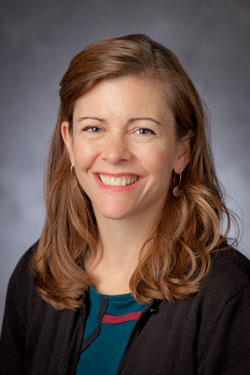CLAC: Building New Ways of Foreign Language Instruction
Initiative ties language learning to other discipline-based study

Most Duke students graduate with proficiency in a second language, but they are not always sure how to apply this knowledge to their major or field of study. A new Duke initiative– Cultures and Languages Across the Curriculum – offers a novel pathway to pair linguistic and cultural knowledge with academic content in other fields.
From alternative medicines in India to Chinese approaches to climate change to German representations of women’s soccer, CLAC uses language instruction to teach disciplinary-based content outside of traditional language classes.
An interview with Deborah Reisinger, a Romance Studies faculty member and director of CLAC at Duke:
Q: What is CLAC?
Deborah Reisinger: CLAC courses are small tutorials tailored to the needs of a specific group of students. Taught in the target language, they use authentic materials produced by other cultures to foster an intercultural approach to learning that enriches critical thinking in a variety of disciplines. CLAC is a four-year initiative supported by Dean Laurie Patton’s office.
Q: How did CLAC start?
Reisinger: CLAC is founded on the principle that students should have multiple opportunities to apply their knowledge of languages to a variety of curricular contexts, including traditional language classroom. The initiative responds to efforts to internationalize the university, as well as to explorations of different approaches to language instruction. The CLAC approach helps students advance beyond a basic level of fluency.
Q: How is CLAC different from a typical language class?
Reisinger: Duke’s language departments offer a wide array of courses that span the arts, humanities, and the professions, from literature, film, politics, intellectual history, visual culture, and linguistics to language for special purposes such as business and medicine. CLAC courses expand upon these offerings by giving students a skillset tailored to a specific area of study. Courses are developed in tandem with faculty from multiple departments, and students learn both language and disciplinary skill from experts in those areas, helping them to bridge the gap between theory and practice.
Q: What kinds of CLAC courses are offered at Duke?
Reisinger: CLAC courses at Duke come in a couple different forms. One model is the ½ credit tutorial taught once a week in the target language. In Voices in Global Health (GLHLTH 270T) students study how culture and language affect health care decisions and learn how to improve interventions. This fall, the course is offered in Hindi, and in the spring, we will have one in Arabic and another in Mandarin Chinese.
Another model is the discussion section, in which the large lecture is in English, and discussion sections take place in a number of languages. This spring, Laurent Dubois’ signature course Soccer Politics (HIST) will follow a CLAC model, with weekly discussions sections offered in German, French, Italian and Spanish.
Q: What kinds of students take CLAC courses? Who are they geared to?
Reisinger: For students who have finished their language requirement and want to extend their fluency, these courses help maintain and build language skills while adding depth to their field of study. For those preparing for or even returning from a service or service-learning experience, CLAC courses offer a unique environment to contextualize and personalize their learning experience.
Because CLAC emphasizes vertical integration, language learners have the opportunity to work with heritage speakers, and undergraduates with graduate students.
Q: How are decisions made about which languages will be offered?
Reisinger: CLAC aims to be needs-driven, and so our first efforts have been to survey students to identify which languages they speak, where they are already working internationally, and where they intend to conduct research, complete service, or work abroad. This semester, we surveyed students in the Global Health institute, the Nicholas School, and the Sanford School of Public Policy, and based on our results, we will be developing a course in Spanish and the Environment and another in Swahili and Global Health.
More information about CLAC can be found on its website, or by e-mailing Reisinger at debsreis@duke.edu.